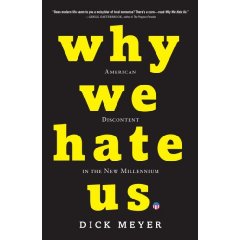
I was born in the 1970s, and even at my tender age, have fallen victim to a creeping cynicism (too often expressed in the form of easy sarcasm) that has me worried lately. I’m too young for such negativity. I haven’t earned that badge. Not yet, anyway. For years, I chalked it up to a generational entitlement: after all, isn’t my brood, Generation X, defined by its feelings of apathy and emotional confusion? That was the message of popular culture at the time. (Just watch “Reality Bites” or read Douglas Coupland’s Generation X.) And it’s the culture that is the problem, writes Dick Meyer in his new book, Why We Hate Us: American Discontent in the New Millennium.
Meyer, the editorial director of digital media at NPR, ticks off the many widely shared annoyances of everyday life: telemarketers, pedestrians with eyes glued to their iPhones, t-shirts emblazoned with vulgar or stupid messages, and the ever-expanding menu of inane reality TV shows.* Lest you think he’s just a grumpy old man, he also takes on weightier subjects, such as the impact of social networking sites, the decline of “organic communities,” the all-pervasive presence of marketing, and our national worship of celebrity, among many other things. All told, it’s a composite of exactly the sort of cultural ugliness that feeds our collective distrust of government, the media, entertainment, and each other.
If, like me, you believe that something is rotten in the state of Denmark, but you’re not sure what, give Meyer’s book a read. You’ll laugh, if nothing else, and might just find that it helps you to look on the bright side of things.
*I have an iPhone, some stupid t-shirts, and have been known to enjoy certain reality TV shows. I have never worked as a telemarketer.














